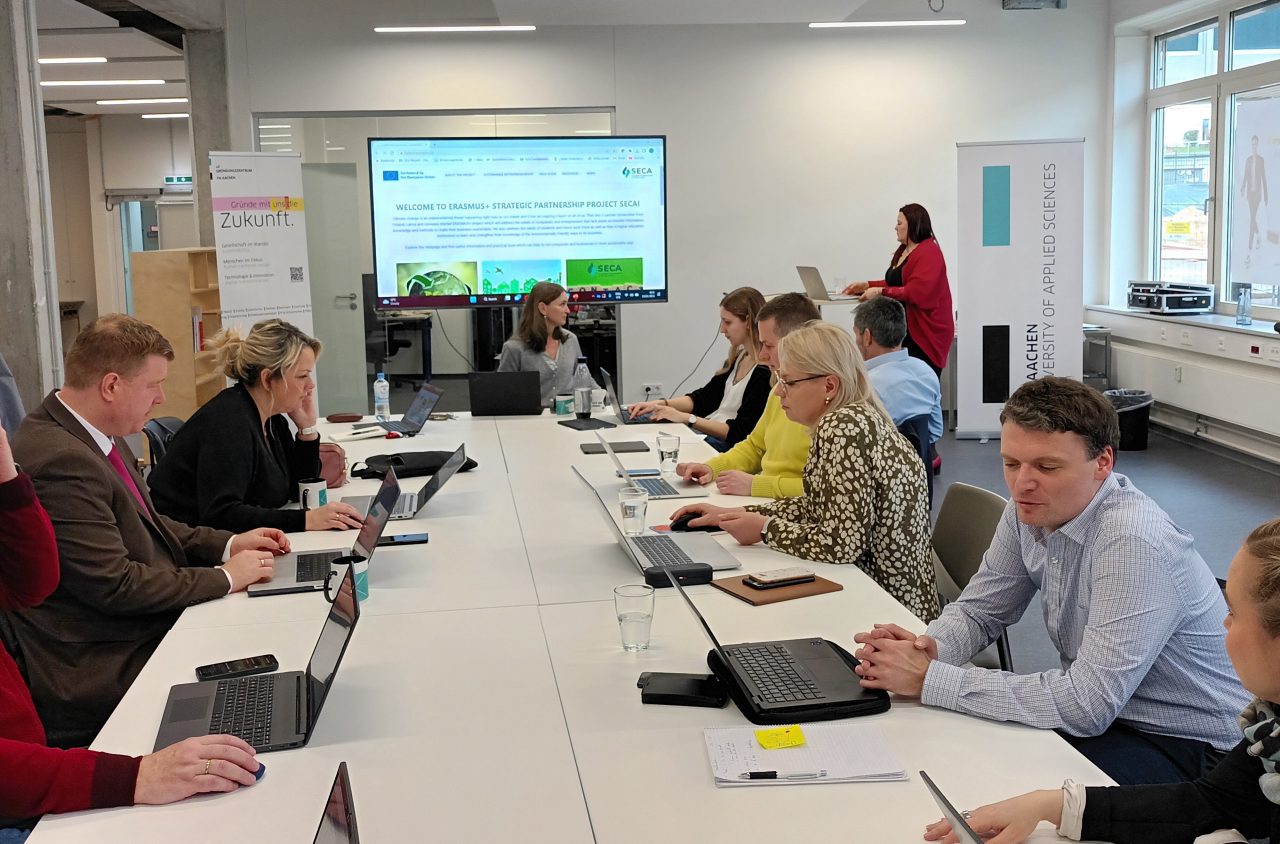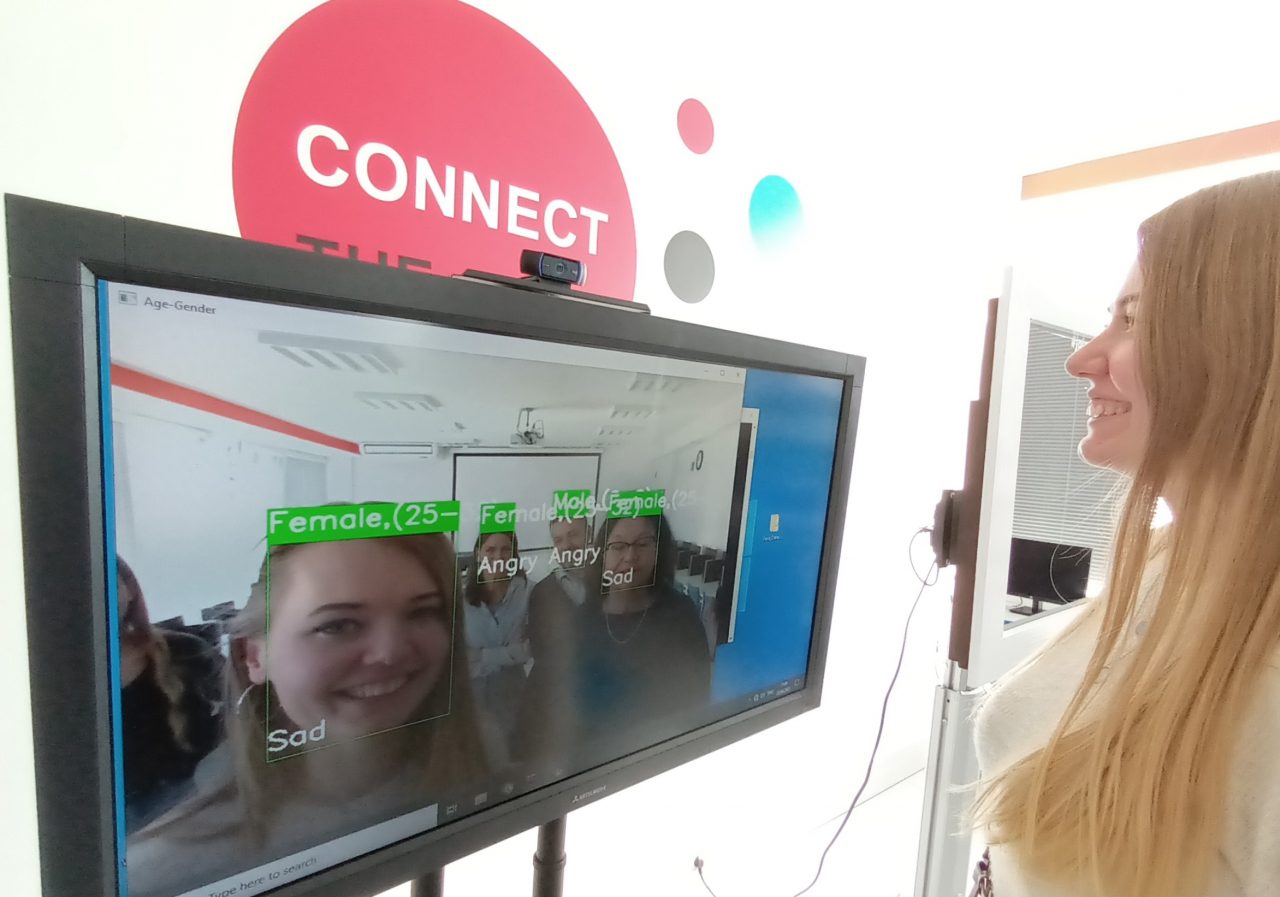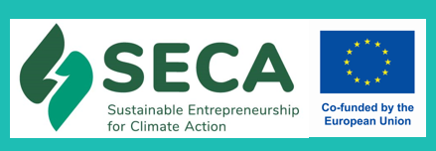Anzelika Krastina, MEd., MBA, senior lecturer, Lapland UAS, Finland
Anete Hänninen, BA, SECA project communication specialist, Lapland UAS, Finland
Ieva Bruksle, PHD candidate, Senior Lecturer, Turiba University, Latvia
Oliver Fuchs, HBO-BE, CE bc. , FH Aachen UAS, Head of International Faculty Office
Faculty of Business Studies, Germany
Abstract
This article highlights the emerging need to develop educational programs to train professionals capable of designing sustainable business models and create sustainable entrepreneurship by taking advantage of new technologies. SECA project partners have undertaken a new initiative to foster AI and VR enabled innovative sustainable entrepreneurship education development.
The need for the green and digital transition is urgent across Europe and globally, and steps need to be taken to provide our businesses and future entrepreneurs the skills and tools they need in order to develop sustainable businesses and have the required skills that can enhance sustainable entrepreneurship. Scholars suggest that AI can aid in creating sustainable business models through various means: such as AI-based analytics and predictive models can assist in optimizing resource usage (Musleh Al-Sartawi et al. 2022), lowering waste and energy consumption, and identifying potential process enhancements. AI-driven supply chain management systems can allow for better monitoring and sustainability tracking, identifying areas for improvement. AI based decision support systems can provide businesses with insights for implementing sustainability initiatives and identifying effective strategies to achieve sustainability goals (Strandhagen et al 2017; Ghobakhloo 2020).
There seems to be rather fragmented teaching and training on how to create Sustainable Business Models (SBM) with the use of AI (Aleixo 2018; Septiani et al.2022). There is currently a lack of appropriate training methods and education for individuals and organisations on the use of AI to create sustainable business models (Bocken&Geradts 2020). Many businesses are not aware of the potential benefits of integrating AI into their sustainability strategies, nor do they have the necessary knowledge and skills to implement AI in a way that supports their sustainability, green transition and digitalization goals.
SECA project initiates a discussion about the future of the education
During two years of the Erasmus+ project Sustainable Entrepreneurship for Climate Action (SECA project, 2023), project partners from Latvia (Turiba University), Germany (FH Aachen) and Finland (Lapland University of Applied Sciences) have been working on the development of the digital training material and educational digital handbook in order to provide the tools that would help start-ups, young entrepreneurs and businesses across the industries to transition towards greener and more sustainable business practices. Among other the project consortium was conducting the study on how to adopt the education offerings to respond to rapidly changing environment and to ensure that the students have future fit skills and knowledge. During intensive study week in Rovaniemi (Finland) and in Aachen (Germany), and transnational meeting in Riga (Latvia) in spring 2023, partners held several workshops where the major problems and needs were defined for the future development. The needs and potential solutions proposed by the partners are summarized in this article.

Picture 1. Project partners discuss digitalisation of training during the meeting in FH Aachen UAS (Germany) in Spring 2023 (Picture credit A.Krastina)
An emerging need for professionals capable of designing sustainable business models by taking advantage of new technologies
Through the research conducted during project and the workshop discussions the project experts concluded that there is an emerging need for professionals capable of designing sustainable business models by taking advantage of new technologies in order to enhance the green transition across economies and societies. There is a need not only for theoretical knowledge, but also a need to develop the practices and methodologies on how to develop sustainable business models (SBM) with artificial intelligence (AI) technology that address environmental and societal challenges, and that would help to educate students and professionals on the importance of innovation and the role of AI in sustainable business development. It was commonly highlighted that there is a need to develop education modules and material on sustainable business models where AI technology is used to enhance sustainable and green business development.
Sustainable Business Model (SBM) is an approach and strategy adopted by businesses to
integrate environmental, social, and economic sustainability governance (ESG) principles into
their operations. These models aim to create long-term value while minimising negative
impacts on the environment and society. Deep tech, including AI and VR, is considered a
valuable tool to enhance SBM and ensure ESG principles in businesses. At present, there is a lack of understanding regarding the intersection of Sustainable Business Models (SBMs) and Artificial Intelligence (AI), and how AI can effectively contribute to the development of SBMs. Moreover, there is a lack of suitable education and training programmes available to address this issue at HEIs and VET level. (Aleixo 2018; Septiani et al.2022)
According to the project experts the development of such educational methodologies would foster innovation in education, new green skills combined with deep tech development, problem-solving skills leading to initiative development, and entrepreneurial mindsets through transnational alliance between education and industry partners, as well as incorporation of specific business case studies and work on own green business idea development. The focus should be developing digital competencies that include deep tech and in particular AI and VR, green skills as a core skills of sustainability to meet emerging professional needs.
In addition, there should be taken actions to stimulate innovation in education design and delivery by incorporating AI and VR tools, inclusive education and training systems that contribute to the development of resilience skills and students’ ability to adapt in an agile manner to the rapidly changing world.
Partners proposed a development of the joint education programme that aims to strengthen digital skills by directly integrating digital tool use and in particular deep tech, such as AI and VR, in the learning process. New joint programme would enhance green skills that are developed through the learning process of building sustainable and green business models, including topics such as climate change, circular economy and green transition strategies.
Use of deep tech to enhance the learning
The project experts suggested that to better facilitate innovative learning approaches, there can be established a Metaverse incubator, that would offer the students immersive virtual learning experiences while developing sustainable business models enabled by VR and AI. The initiative to develop a Metaverse environment for educational purposes was introduced by a group of partners as an innovative approach to revolutionize entrepreneurship education. The Metaverse, as defined by Zhang (2022)and others, is a 3D digital realm that combines elements of the physical and virtual worlds, effectively overcoming various constraints like time and location associated with the real world.
In Metaverse users can participate in a wide range of activities using avatars, interact with other participants, manipulate virtual objects, and even modify the environment’s content. It is worth noting that education stands out as one of the most promising applications of the Metaverse, holding great potential in the foreseeable future. In the context of education, the Metaverse can be seen as an enhanced educational environment, where Metaverse-related technologies seamlessly blend with aspects of both the virtual and real educational settings. This innovative approach enables learners to access educational content through wearable devices, freeing them from the limitations of time and place, and allowing them to engage in real-time interactions using digital avatars across various forms of educational resources. (e.g., avatars, intelligent NPCs, or virtual learning resources).

Picture 2. Partners testing various deep technologies during the transnational meeting in Riga, in spring 2023. (Picture credit A.Krastina)
Expanding transnational collaboration to create European added value
During SECA project it was apparent how the combination of the expertise from all the partners enhances the prospective and inspires for new development ideas. Transnational EU wide collaboration was considered as an essential element for innovative university education development that fosters European added value.The importance of the topic was recognized not only by the core project partners from Germany, Latvia and Finland, but also experts from universities in Sweden and the Netherlands. With the vision for the future development the current SECA consortium was enlarged recognizing the potential of common actions that can positively impact society and the economy in Europe and in the partners countries in Germany, Latvia, Sweden, Netherlands, and Finland and thus across Europe. The challenge of the development of innovative education and training for sustainable entrepreneurship enabled by AI and deep tech is seen as a driving force to jointly undertake the actions in the partnership across the borders in order to achieve common goals. The joint work of enlarged consortium continues in it´s active phase of development with the clear vision and understanding of current needs and trends.
About SECA project
Sustainable Entrepreneurship for Climate Action (SECA) is 2 years (2022-2024) project co-funded by Erasmus+ progamme, and is implemented by the project partners from Latvia (Turiba University), Germany (FH Aachen) and Finland (Lapland University of Applied Sciences). The project aims to enhance the solutions to Climate action through sustainable entrepreneurship training and digital training material development.

References:
Aleixo, A.M., Leal, S. and Azeiteiro, U.M., 2018. Conceptualization of sustainable higher education institutions, roles, barriers, and challenges for sustainability: An exploratory study in Portugal. Journal of cleaner production, 172, pp.1664-1673.
Ghobakhloo, M., 2020. Industry 4.0, digitization, and opportunities for sustainability. Journal of cleaner production, 252, p.119869.
Bocken, N.M. and Geradts, T.H., 2020. Barriers and drivers to sustainable business model innovation: Organization design and dynamic capabilities. Long range planning, 53(4), p.101950.
Musleh Al-Sartawi, A.M., Hussainey, K. and Razzaque, A., 2022. The role of artificial intelligence in sustainable finance. Journal of Sustainable Finance & Investment, pp.1-6.
Strandhagen, J.O., Vallandingham, L.R., Fragapane, G., Strandhagen, J.W., Stangeland, A.B.H. and Sharma, N., 2017. Logistics 4.0 and emerging sustainable business models. Advances in Manufacturing, 5, pp.359-369.
Septiani, N., Bist, A.S., Bangun, C.S. and Dolan, E., 2022. Digital Business Student Development for Entrepreneurs with Software. Startupreneur Bisnis Digital (SABDA Journal), 1(1), pp.33-43.
SECA project. 2023. https://sustainable.turiba.lv/ Retrieved 10 October 2023
Zhang, G., Cao, J., Liu, D. and Qi, J., 2022. Popularity of the metaverse: Embodied social presence theory perspective. Frontiers in psychology, 13, p.997751.